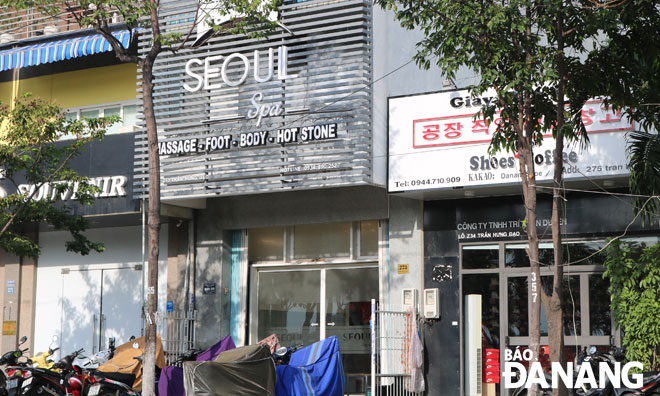Business establishments violate the State regulations about advertising signboards
Recently, many hotels, restaurants, shops and service providers across Da Nang, especially those along such tourist-packed streets as Vo Nguyen Giap, Vo Van Kiet and Nguyen Van Thoai, and the An Thuong Tourist Quarter, have been found to be violating the State regulations about advertising signboards.
 |
| Some service facilities and shops on Tran Hung Dao Street in Son Tra District displaying their billboards in foreign languages |
In particular, a large number of service providers on Tran Bach Dang Street have displayed their signboards which feature foreign words only, or both Vietnamese and foreign languages, but the Vietnamese words are dominated by the foreign ones in size, colour and position.
For instance, a restaurant at 44 Tran Bach Dang Street has its billboard in Chinese language. Only the address of the restaurant is written in Vietnamese. In another case, a travel agency at 51 Tran Bach Dang Street has been found to have its signboard written entirely in South Korean language.
Also along the street, 80% of restaurants, food stores, and beauty salons have their signboards and billboards written in both Vietnamese and Chinese languages. However, Vietnamese language text accounts for only 30% of the advertisement content on these billboards, or the font size of Vietnamese words is smaller than that of Chinese words.
Ms Nguyen Thi Hong Van from Ha Noi’s Hoan Kiem District said there were many billboards featuring only Chinese language across Da Nang. As looking at these signboards without illustrative images, she did not know what these shops were selling.
“I feel like a fish out of water as going shopping and go sightseeing on local streets with Chinese language dominating shops' signboards”, she added.
 |
| A restaurant at 44 Tran Bach Dang Street with a billboard written in Chinese. Only the address of the restaurant is written in Vietnamese. |
A spokesperson for the municipal Department of Tourism explained the reason for a boom in billboards featuring foreign languages that the city has recently received a considerable number of Chinese and South Korean tourists, so owners of numerous business establishments have changed the languages written on their billboards and menus to catch customers’ attention.
According to the statistics released by the Department, in 2018 alone, the number of South Korean and Chinese visitors accounted for over 80% of the city’s total international visitor arrivals to the city.
In an attempt to deal with this matter of concern, the municipal People’s Committee has asked the district-level authorities to pay inspection visits to some production and business establishments within the localities, and punish those violating the State regulations about advertising signboards.
Importance will be attached to widely promoting the publicity of the Vietnamese Advertisement Law, especially the accurate presentation of Vietnamese and foreign languages on billboards and signboards.
Under the 2012 Vietnamese Law on Advertisement, the advertisement content, whether spoken or written, must be in Vietnamese.
Foreign languages can only be adopted when representing foreign brands, trademarks, proper names or internationalised words which can’t be replaced with Vietnamese.
In such cases, the signs must use both Vietnamese and a foreign language, and the font size of foreign words must be no more than three-fourths of the Vietnamese words, and must be placed beneath the Vietnamese words.